is delighted to welcome aboard another new contributor, Trevor James Lamb. Based in Hangzhou, Zhejiang province, Trevor is a youth football coach with Sinobal FC, an amateur club based in the city. With the root of many of Chinese football’s numerous problems stemming from youth soccer, Trevor couldn’t be better placed to offer insights and stories from the vitally-important grassroots level. is fortunate indeed to be able to offer news and analysis from his unique perspective. In his first article below, Trevor examines the typical problems encountered at youth level in Chinese football and points to developing football in rural areas as a way forward for China.
Bu yao shou qiu
“Bu yao shou qiu!” or ‘no hands!’ a school teacher yells at the six year old who innocuously and playfully stopped the ball with the palm of his hand. It’s no use after I try to explain to the teacher that it’s ok to it slide, eliminating handballs is hardly the biggest challenge in Chinese youth soccer. Increasing player population remains the uphill battle most youth soccer clubs are currently facing. The teacher scratches his head. Change takes time in China.
Simple soccer? Not in China
Time and time again the football pundits have pointed to the same source of disappointment experienced by the Chinese men’s national team. It all starts with the youth. Yet, we find that the current situation of grassroots football development in China is in a state of decline. Ten years ago, following China’s first appearance in the FIFA world cup, there were over four thousand football schools throughout the country. Today that number has decreased to less than twenty, with the number of youth players following suit. Personally, as a youth soccer coach in Hangzhou, Zhejiang province with Sinobal FC I have learned that there are many factors to consider in developing ‘the people’s sport’ in the world’s most populous nation. In China, somehow the simplicity of the beautiful game is transformed into a never ending Chinese knot.
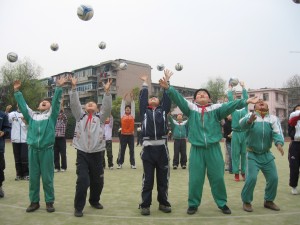
The time most Chinese Children today spend playing football (or other sports) to academics is proportionate to the light the earth receives from the sun and moon, respectively.
Have you ever heard of a football festival? Neither had I until my first day on the job when a group of coaches from our club went to a local middle school where we would organize a school wide football event. Soon after arrival there are hundreds of screaming children, ready to play football games, cheer on their school football team, and of course get autographs from the big nosed laowai. After several hours of exhausting our coaching enthusiasm the principal, teachers, and most importantly the children were all quite satisfied with the one day extravaganza and respite from routine classroom work. This is a typical activity organized by Sinobal FC, and other clubs and organizations involved in the 44 Cities Project enacted three years ago. However, while most all of the youth involved in such activities are delighted with their experience, the greater picture of grassroots football in China is hardly a pretty site.
Many persons have been able to identify the macro problems with Chinese youth football development, stating that the soviet style training system is inappropriate for football development and a new system that is inclusive and expansive throughout the population of Chinese youth is the only way to provide and sustain quality at the highest level. Still, few have made collective efforts to successfully engage the next generation of soccer players, coaches, referees, and fans in China. Why? First of all, from the top down very few have been able to find business opportunity or profit in the Chinese youth soccer market. If this was not the case you can be certain that an economically successful youth soccer club in China would have been duplicated a thousand times over by now. Meanwhile, from the bottom-up perspective, the development of the sport encounters many more obstacles.
Fake youths
One key issue that remains like a snake in the grass is age verification. On more than a few occasions of asking Chinese soccer players (men and women) their age they have responded, “My age on my I.D. or my real age?” Traditionally it has been quite normal practice for players to fake their age, change their I.D. and sometimes even their name to gain advantage over their peers. Yet, few consider the crippling implications of such actions on the entire system of competitive youth soccer. Research in sports science shows that even in a twelve month calendar players born between January to March have a developmental advantage over peers born later in the same year. Magnify the effect by an additional year or two and the result is creating an environment where the development of a group of players is sacrificed for the betterment of a single individual, who many not even possess more talent than those same younger peers. The nationwide development of any team sport will be inhibited by such practices.
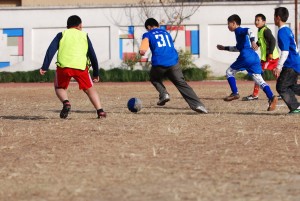
Grassroots soccer in China, like this pitch, currently lies barren and in need of an injection of life.
All work and no play makes Xiao Bo a dull footballer
Even if there was no one faking age in China, youth football clubs would still encounter many difficulties. To put it simply, there’s too little encouragement from parents and teachers for children to play football competitively, or even recreationally. There’s too much responsibility and expectation on performance in the classroom for most city children to have any motivation or time to pursue even a friendly kick-a-around with neighborhood friends, nevermind regular organized matches. So a typical 11-year-old boy has an average of three hours of homework everyday, not to mention regular extracurricular classes and tutoring to attend. Forget playing the game, Xiao Bo never has a chance to even daydream about scoring goals or even watch any kind of professional football other than the occasional highlight of Lionel Messi and Christiano Ronaldo lighting up their respective leagues. Meanwhile there remains no football equivalent to recent retiree and basketball legend Yao Ming. Such a hero in Chinese football would be nothing short of inspirational. And inspiration is exactly what the overbearing youth environment of your average Chinese lacks. By the time that the ‘little emperors’ show up to the field they are only interested in smashing the ball in the back of the net with all their force. Concepts like ball control and team work are unfamiliar territory in their realm of play.
Rural football – the way forward?
Despite this, some stay optimistic. Football clubs and associations in China continue to search for new solutions to the convoluted situation of youth football. City-wide co-op projects between schools and clubs have been used to increase player population and seen successful results at elementary school level. Still as players age into their teenage years, conflicts with formal education makes football a lesser priority. One massive population yet explored by clubs is rural areas in China, where a majority of Chinese still live. It is there where more exceptions to the single-child policy are found, where the overbearing academic environment lessens itself, and where there exists actual space for playing fields. Such conditions make rural China a new frontier for the development of youth football. With the proper organization and incentive system established, the countryside could become a hotbed for football development and success in China. The only question that remains is who will take leadership of such a vast project?
The future
FIFA awarded China in 2009 for its substantial efforts to support, develop, and promote the game. However, at the local level, clubs not benefiting from such support have little incentive to continue their efforts and recruit professional and experienced employees. There’s always the advent of getting foreign clubs involved, and some big name clubs have established football academies in their name, but change comes from within. Chinese parents and children can only hope for more chances to play soccer, as the national side can only hope for a miracle player to come from the depths of China.
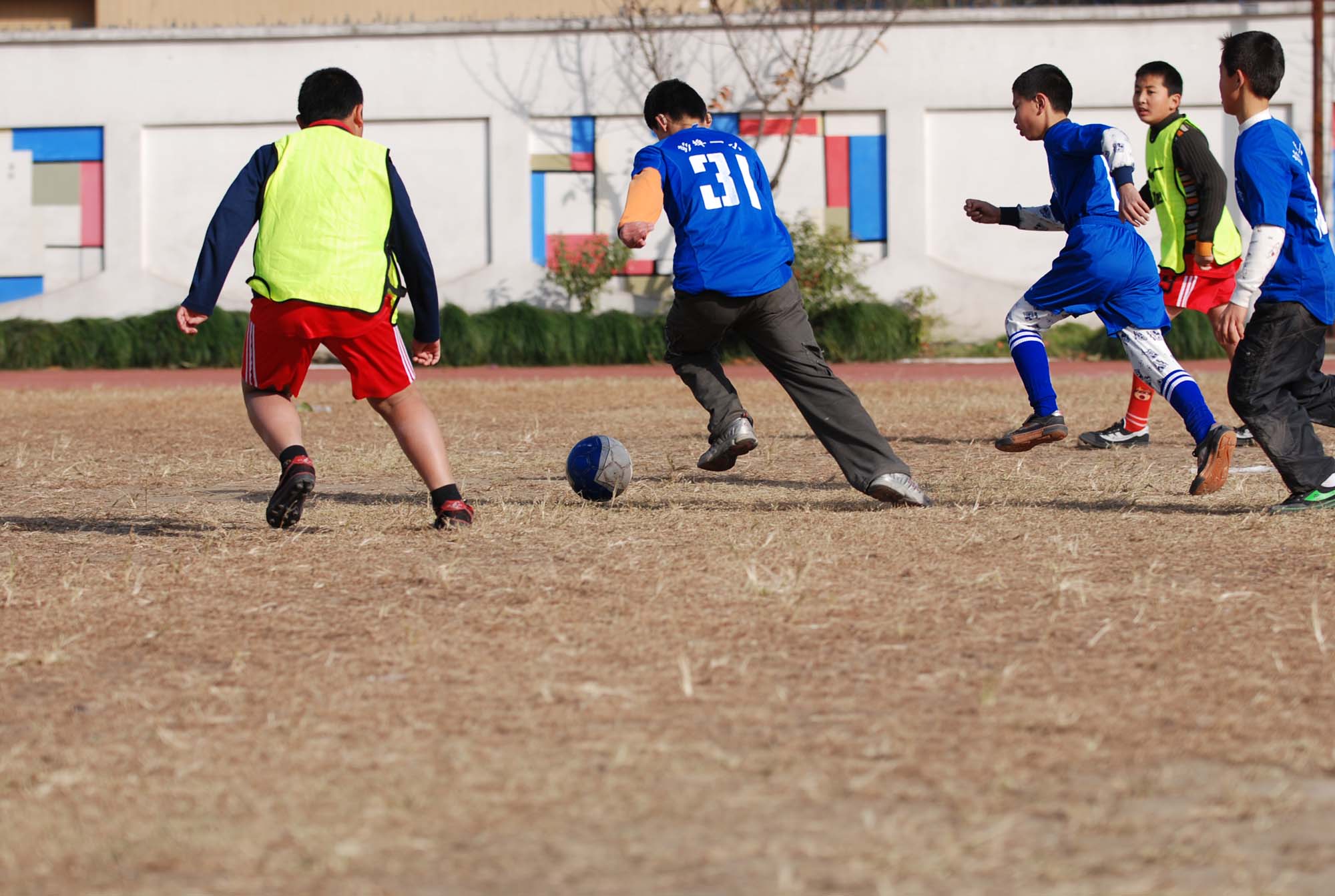
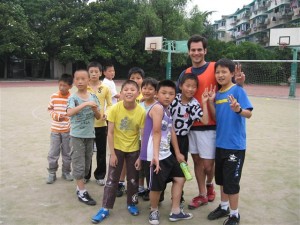
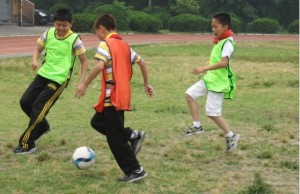
Great article there Trevor, keep up the good work.
Excellent article. Well-written and insightful.
Two suggestions toward “priming the pump,” Trevor.
One: Find a talented person or entertainment firm capable of adapting/writing/producing a movie (or play/opera) that patallels “MUSIC MAN.” Meredith Wilson captured (with great humor) the phenomenon of so many towns and schools wanting a local brass band and all that went with it. Maybe a comic strip would do it if a Chinese “Charlie Brown” could be developed. Whatever the genre, the age 8 -12 football/soccer player theme would have to prove funny and acceptable to kids, parents teachers, administrators, etc. Maybe a contest with a few prizes of value could stimulate some talented people to get creative if the specs were not too rigid.
Two: Get a small ad hoc group of talented people to DESIGN (sketch) maybe three “business models” of a sustainable and flexible kids football program that could be implemented in one nearby Province which would embrace the culture of both city and ‘country’ families, school curricula demands, etc. Pilot test all three models with volunteer leaders for at least a couple of seasons.
Invite a professor of sports and recreation from a good university to objectively track the roll out of all 3 models and write a research paper on facts and conclusions. Use the report to help put together the best ongoing business model (meanwhile keep the comic strip/movie people informed all along the way. Remind frequently (plan for a lot of “turnover of helpers) all volunteers and entrepreneurs all along the way of the priciple objectives.
G. Erstwhile
Thank you everyone for the positive feedback, and thank you Mr/Mrs. Erstwhile for the great suggestions. Your first point to popularize football via other forms of entertainment is spot on, and actually something that we have been brainstorming for some time at Sinobal. The second point is a outstanding blueprint for developmental research in rural communities. In fact, we’re already going through the process of surveying several rural communities to ‘test the waters’ and better understand local circumstances. With any luck University research partners and volunteers will be secured before the end of the year, and ’12 marking the initiation of such a project. If you have experience in such fields of expertise and are interested in participating , you would be a most welcomed addition to the project.